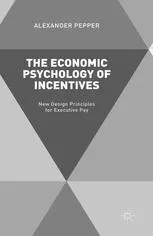معرفی کتاب
کتاب «The Economic Psychology of Incentives: New Design Principles for Executive Pay» نوشتهی الکساندر پِپِر، به بررسی عمیق موضوع پیچیده و همواره بحثبرانگیز پرداختهای اجرایی میپردازد. این کتاب تلاش میکند تا با استفاده از مفاهیم روانشناسی اقتصادی و ترکیب آنها با نظریههای مدرن در حوزه مدیریت منابع انسانی، طراحی جدیدی از سیستمهای انگیزشی برای مدیران اجرایی ارائه دهد.
خلاصه کتاب
در این کتاب، پِپِر به بررسی نواقص سیستمهای فعلی پرداختهای اجرایی میپردازد و چالشهایی که این سیستمها برای سازمانها و جوامع اقتصادی ایجاد میکنند را تحلیل میکند. وی با استناد به تحقیقات معتبر و کیس استادیهای مختلف، دیدگاههای جدیدی ارائه میدهد که چگونه این سیستمها میتوانند به گونهای اصلاح شوند که هم انگیزههای اقتصادی و هم انسانی در نظر گرفته شوند. یکی از نقاط قوت کتاب، تأکید بر درک نیازهای روانشناختی مدیران و تلاش برای همسو کردن آن با اهداف اقتصادی است که باعث شکلگیری سیستمهای تشویقی کارآمدتر میشود.
نکات کلیدی
- درک عمیقتر از تاثیرات روانشناختی پاداشهای مالی بر رفتار مدیران
- بررسی مدلهای جدید طراحی سیستمهای پرداخت بر اساس دانش روانشناسی اقتصادی
- راهکارهای عملی برای پیادهسازی سیستمهای انگیزشی مؤثر در سازمانها
- تحلیل نواقص فعلی سیستمهای پرداخت و دستگاههای تشویقی سنتی
نقلقولهای معروف از کتاب
«انگیزههای پولی میتوانند به همان اندازه که ایجاد انگیزه میکنند، مخرب نیز باشند اگر به درستی طراحی نشده باشند.»
«کارایی یک سیستم پاداش در نهایت به میزان درک از نیازها و خواستههای انسانی بستگی دارد.»
چرا این کتاب مهم است؟
این کتاب به دلیل ارائه دیدگاههای نو و تحلیلهای کاربردی، برای مدیـران عالیرتبه سازمانها، سیاستگذاران و محققان مدیریت منابع انسانی اهمیت زیادی دارد. همچنین به سازمانها کمک میکند تا با اصلاح روشهای پرداخت، نیروی انسانی خود را کارآمدتر سازند و به اهداف استراتژیک خود دست یابند. در عصر کنونی که تغییرات سریع اقتصادی و فناوری تاثیرات مهمی بر سازوکار سازمانها دارند، داشتن درک عمیقتری از انگیزههای انسانی میتواند به ایجاد سازمانهایی پایدار و موفق کمک کند.















